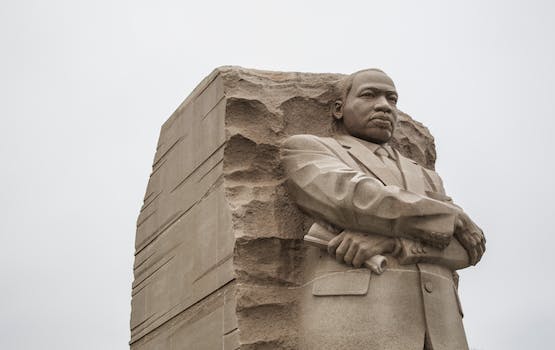

-
Table of Contents
- Introduction
- The Historical Significance of MLK Day in Addressing Racism and Empowerment in African American Communities
- Examining the Role of Education in Empowering African American Communities and Combating Racism
- Exploring the Impact of Economic Empowerment on African American Communities in the Fight Against Racism
- Q&A
- Conclusion
"Unveiling the Power Within: Illuminating the Journey of Empowerment in African American Communities"
Introduction
The Intersection of Racism and Empowerment in African American Communities: Reflecting on MLK Day
MLK Day, celebrated annually on the third Monday of January, serves as a time to honor the life and legacy of Dr. Martin Luther King Jr. This day provides an opportunity to reflect on the ongoing struggle against racism and the pursuit of empowerment within African American communities. The intersection of racism and empowerment is a complex and multifaceted issue that continues to shape the experiences and aspirations of African Americans today. This article aims to explore this intersection, highlighting the challenges faced by African American communities and the importance of empowerment in overcoming systemic racism.
The Historical Significance of MLK Day in Addressing Racism and Empowerment in African American Communities
The Historical Significance of MLK Day in Addressing Racism and Empowerment in African American Communities
Martin Luther King Jr. Day, celebrated annually on the third Monday of January, holds immense historical significance in addressing racism and empowerment in African American communities. This day serves as a reminder of the tireless efforts and sacrifices made by Dr. King and countless others in the fight for civil rights. It is a time for reflection, education, and action, as we continue to strive for equality and justice.
The origins of MLK Day can be traced back to the late 1960s, shortly after Dr. King's assassination in 1968. It was not until 1983, however, that legislation was signed into law, designating the third Monday of January as a federal holiday in honor of Dr. King. This recognition was a significant step towards acknowledging the importance of his work and the ongoing struggle for racial equality.
MLK Day serves as a powerful reminder of the systemic racism that has plagued African American communities throughout history. Dr. King's leadership during the Civil Rights Movement brought attention to the injustices faced by African Americans, including segregation, discrimination, and violence. His nonviolent approach and powerful speeches, such as the iconic "I Have a Dream" speech, inspired millions and galvanized a movement.
The holiday also provides an opportunity to reflect on the progress that has been made since the days of the Civil Rights Movement. While significant strides have been made, racism and inequality persist in various forms. MLK Day reminds us that the fight for justice is far from over and that we must continue to work towards dismantling systemic racism.
Empowerment is a central theme in MLK Day celebrations. Dr. King believed in the power of education, economic empowerment, and political engagement to uplift African American communities. He advocated for equal access to quality education, job opportunities, and the right to vote. MLK Day serves as a call to action, urging individuals and communities to actively work towards empowering African Americans and dismantling the barriers that hinder their progress.
Education plays a crucial role in addressing racism and empowering African American communities. MLK Day provides an opportunity to educate ourselves and others about the history of racial injustice and the ongoing struggles faced by African Americans. By understanding the past, we can better comprehend the present and work towards a more equitable future.
Economic empowerment is another vital aspect of MLK Day. Dr. King emphasized the importance of economic justice and equal economic opportunities for all. MLK Day encourages individuals and communities to support African American-owned businesses, invest in minority communities, and advocate for policies that promote economic equality.
Political engagement is also a key component of MLK Day celebrations. Dr. King fought tirelessly for the right to vote and believed in the power of political participation to effect change. MLK Day serves as a reminder of the importance of voting, advocating for policies that promote equality, and holding elected officials accountable.
In conclusion, MLK Day holds immense historical significance in addressing racism and empowerment in African American communities. It serves as a reminder of the ongoing struggle for racial equality and justice. MLK Day calls upon us to reflect on the past, educate ourselves, and take action to empower African Americans and dismantle systemic racism. By honoring Dr. King's legacy, we can work towards a more just and equitable society for all.
Examining the Role of Education in Empowering African American Communities and Combating Racism

The celebration of Martin Luther King Jr. Day provides an opportunity to reflect on the intersection of racism and empowerment in African American communities. One crucial aspect to consider is the role of education in empowering these communities and combating racism. Education has long been recognized as a powerful tool for social change, and it continues to play a vital role in the fight against racism.
Historically, African Americans have faced numerous barriers to accessing quality education. From slavery to segregation, the systemic oppression of African Americans has limited their educational opportunities. However, the Civil Rights Movement, led by Dr. Martin Luther King Jr., fought to dismantle these barriers and ensure equal access to education for all.
Education empowers African American communities by providing them with the knowledge and skills necessary to challenge and overcome racism. It equips individuals with critical thinking abilities, enabling them to question and challenge discriminatory practices. Education also fosters a sense of self-worth and confidence, empowering individuals to advocate for their rights and demand equality.
Furthermore, education plays a crucial role in dismantling stereotypes and promoting understanding between different racial and ethnic groups. By learning about the contributions and achievements of African Americans throughout history, students gain a more accurate and inclusive understanding of American society. This knowledge helps to break down racial prejudices and fosters empathy and respect among diverse communities.
However, despite the progress made in the fight for educational equality, significant disparities still exist. African American students continue to face disproportionate challenges, including lower graduation rates, higher dropout rates, and limited access to quality resources. These disparities are often rooted in systemic racism and socioeconomic inequalities that persist in our society.
To address these disparities, it is essential to invest in equitable educational opportunities for African American communities. This includes providing adequate funding for schools in low-income areas, ensuring access to quality teachers and resources, and implementing culturally responsive curricula. By addressing these structural barriers, we can empower African American students and provide them with the tools they need to succeed.
Moreover, it is crucial to recognize the importance of representation in education. African American students benefit from seeing themselves reflected in their teachers, textbooks, and curriculum. Representation not only fosters a sense of belonging and pride but also challenges stereotypes and promotes a more inclusive educational environment.
In addition to the role of formal education, community-based initiatives also play a significant role in empowering African American communities and combating racism. These initiatives focus on providing mentorship, tutoring, and enrichment programs that supplement formal education. By engaging with community leaders and organizations, African American students can access additional support and resources that contribute to their academic success and personal development.
In conclusion, education is a powerful tool in empowering African American communities and combating racism. It equips individuals with the knowledge, skills, and confidence necessary to challenge discriminatory practices and demand equality. However, significant disparities still exist, and it is crucial to address these through equitable educational opportunities and community-based initiatives. By investing in education and promoting representation, we can continue the work of Dr. Martin Luther King Jr. and create a more inclusive and just society for all.
Exploring the Impact of Economic Empowerment on African American Communities in the Fight Against Racism
The fight against racism has been a long and arduous journey for African American communities in the United States. Throughout history, African Americans have faced systemic oppression and discrimination, which has hindered their progress and limited their opportunities for economic empowerment. However, in recent years, there has been a growing recognition of the intersection between racism and economic empowerment, and the role it plays in dismantling systemic racism.
One significant event that highlights this intersection is Martin Luther King Jr. Day, a national holiday that honors the life and legacy of the civil rights leader. MLK Day serves as a reminder of the ongoing struggle for racial equality and the importance of economic empowerment in African American communities.
Economic empowerment refers to the ability of individuals and communities to control their economic resources and participate fully in the economy. It encompasses access to education, employment, housing, and financial resources. For African American communities, economic empowerment is crucial in breaking the cycle of poverty and overcoming the barriers imposed by racism.
Historically, African Americans have faced numerous obstacles to economic empowerment. From slavery to Jim Crow laws, discriminatory practices have limited their access to education and employment opportunities. These barriers have perpetuated a cycle of poverty and inequality that continues to affect African American communities today.
However, there have been significant strides towards economic empowerment in recent years. Initiatives such as affirmative action and equal opportunity employment have aimed to level the playing field and provide African Americans with equal access to education and employment. These efforts have helped to increase representation and create economic opportunities for African Americans.
Furthermore, the rise of black-owned businesses and entrepreneurship has played a crucial role in empowering African American communities. By creating their own businesses, African Americans have been able to generate wealth, create jobs, and contribute to the economic growth of their communities. This economic empowerment not only provides financial stability but also fosters a sense of pride and self-determination within African American communities.
However, it is important to recognize that economic empowerment alone is not enough to eradicate racism. While economic progress is essential, it must be accompanied by social and political change. Racism is deeply ingrained in the fabric of society, and dismantling it requires a multifaceted approach.
Education is a key component in this fight against racism. By providing quality education to all children, regardless of their race or socioeconomic background, we can equip future generations with the knowledge and skills to challenge and overcome racism. Additionally, promoting diversity and inclusion in all aspects of society, from the workplace to the media, is crucial in breaking down stereotypes and promoting equality.
In conclusion, the intersection of racism and economic empowerment is a critical aspect of the fight against racism in African American communities. MLK Day serves as a reminder of the ongoing struggle for racial equality and the importance of economic empowerment in breaking the cycle of poverty and inequality. While progress has been made, there is still much work to be done. By continuing to address the barriers to economic empowerment and promoting social and political change, we can create a more equitable and just society for all.
Q&A
1. How does racism impact empowerment in African American communities?
Racism can hinder empowerment in African American communities by creating systemic barriers to education, employment, and equal opportunities, which can limit individuals' ability to achieve their full potential.
2. How does MLK Day contribute to reflecting on the intersection of racism and empowerment in African American communities?
MLK Day serves as a reminder of the ongoing struggle against racism and the importance of empowerment in African American communities. It provides an opportunity to reflect on Dr. Martin Luther King Jr.'s legacy and the progress made, while also acknowledging the work that still needs to be done.
3. What are some ways to address the intersection of racism and empowerment in African American communities?
Addressing the intersection of racism and empowerment requires implementing policies that promote equal access to education, healthcare, and economic opportunities. It also involves fostering inclusive environments, promoting diversity and representation, and engaging in open conversations about race and systemic racism.
Conclusion
In conclusion, MLK Day serves as a reminder of the intersection of racism and empowerment in African American communities. It is a time to reflect on the ongoing struggle for racial equality and the importance of empowering marginalized communities. MLK's legacy continues to inspire individuals to fight against racism and work towards a more inclusive and just society.











